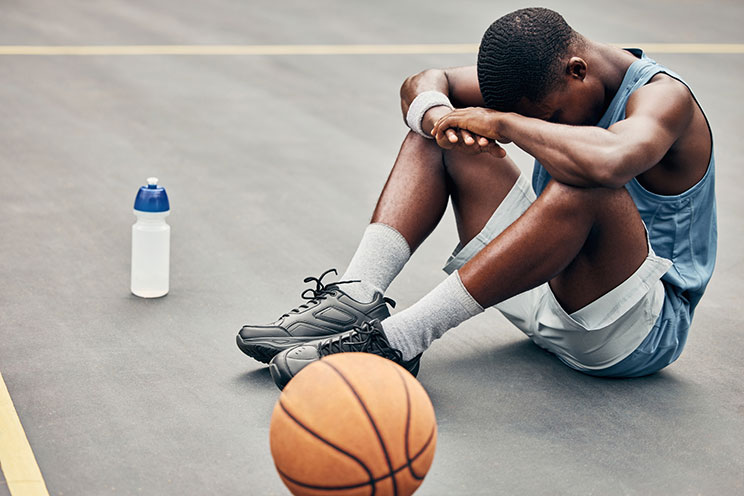Sport Psychology Clinic
Get sport psychology care from a sports medicine leader.
Henry Ford Sports Medicine works with athletes at all levels to treat injuries and optimize performance. However, our experts also understand that there are several challenges in an athlete’s life that can take a toll on mental health, everything from demanding schedules and the pressure to perform, to dealing with injuries. This is why we offer a dedicated clinic in the emerging field of sport psychology, which is led by sport psychology clinician, Seth Swary, Ph.D.
Sport psychology care: Why choose Henry Ford Health?
- Embedded clinic: We offer one of few clinics in the nation that’s part of a larger Sports Medicine department.
- Access: We collaborate with local high schools, colleges and professional teams, helping to streamline referrals and access for athletes at all levels.
- We treat the whole athlete: Our team of sport psychology and sports medicine specialists coordinate with Henry Ford Health experts in orthopaedics, cardiology, neurology, ophthalmology, ear nose and throat, nutrition, primary care, physical therapy and athletic training.
- Where the pros go: We are the Official Team Physicians for the Detroit Pistons and the United States Football League, Official Healthcare Provider to the Detroit Lions and Official Sports Medicine Provider for the Detroit Free Press Marathon. But you don’t have to be a pro to get the same sports treatment professionals trust.
- Personalized counseling: Different sports and concerns require different coping strategies and adjustments. Your sport psychologist will tailor your treatment plan to your specific situation and needs.
- Performance optimization: You see a strength coach when you’re healthy and want to improve your performance. The same is true for meeting with a sport psychologist. All athletes can benefit from having a clear picture of their well-being and honing mental skills to get a performance edge.
Center for Athletic Medicine
Our Sport Psychology Clinic is located in the Center for Athletic Medicine in Detroit. This facility serves as the epicenter for athletes at all levels and in every sport to heal, condition and optimize your performance. We provide a multidisciplinary approach to sports medicine with internationally recognized physicians in areas of orthopaedics, concussion, brain health, cardiology and sleep medicine.
Sport psychology concerns we treat
- Navigating demanding schedules: For many, being an athlete can feel like a full-time job. And for students, it’s like having a second job. School athletes spend a lot of time conditioning, practicing, watching film and traveling. It’s a lot of pack on top of attending classes, doing homework and having a regular social life. This strain can impact your well-being and performance.
- Pressure to perform: Athletes are highly visible. When a student fails a test, it’s not broadcast to everyone. But if you play badly in a game, you may face public pressure from coaches, teammates, family and others. You may also receive negative feedback on social media. All of this can lead to anxiety and other issues that affect both your mental health and performance.
- Body image: Sports that requires revealing outfits such as gymnastics or diving, or which have an increased focus on weight, such as wrestling, can make it difficult to maintain a healthy body image. For some, this can lead to an increased risk of developing an eating disorder.
- Debilitating injuries: Major physical injuries can require surgery and rehabilitation, and they also may take you out of the game for an extended period. Dealing with this disruption in your normal athletic life and routine can negatively impact your mental health.
- Career transitions: When you move from one level of your sport to another (middle school to high school, high school to college, college to professional), it can be a huge adjustment. This may be difficult to navigate, especially since other aspects of your life are changing at the same time. Likewise, if you are transitioning out of your sport for good, especially if you’ve been competing in it for your whole life, it can cause identity issues. Meeting with a sport psychologist can help you learn ways to make a smooth, healthy transition.
What to expect in your sport psychology treatment
A sport psychologist acts as a strength training coach for your mind. As with any conditioning program, treatment starts with an assessment to determine where you’re at. This includes discussing:
- Personal sports history and background
- Life outside of sports
- Support networks
- Difficulty in balancing your schedule and commitments
- Other issues you’re dealing with in your sport, school or personal life
- Performance goals and other expectations
Then, your sport psychologist will work with you to develop a personalized, interactive treatment plan that addresses any issues while optimizing your performance. This includes learning and practicing new coping strategies to help you continue to move forward after treatment—and to be better prepared for other mental health challenges in the future. A typical treatment plan includes 6-8 sessions.
.svg?iar=0&hash=F6049510E33E4E6D8196C26CCC0A64A4)

/hfh-logo-main--white.svg?iar=0&hash=ED491CBFADFB7670FAE94559C98D7798)
